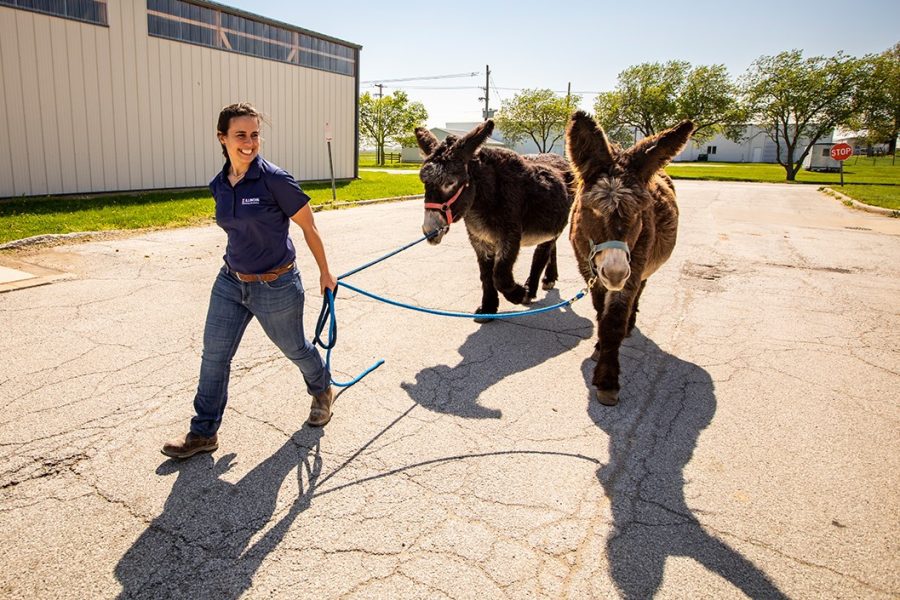Illinois veterinarians lead efforts to save endangered donkey breed
Photo courtesy of Michelle Hassel/Illinois News Bureau
Dr. Giorgia Podico, veterinarian at the University, leads Sophie and Sourbette back to the reproductive medicine wing of the Large Animal Clinic. These Baudet du Poitou species of donkeys are currently endangered and Illinois veterinarians aid in resolving the issue.
Jun 20, 2022
Sophie and Sourbette are both Baudet du Poitou jennies — female donkeys — a donkey breed that has become endangered over time. Now, they remain central to initiatives that Illinois veterinarians are integrating to breed them and ensure the breed’s survival.
Sophie and Sourbette can sometimes be found enjoying the outdoor sun at the College of Veterinary Medicine. They share a close bond with each other to the extent that they have similar personalities, being described as slow yet fun to work with.
Dr. Giorgia Podico, a veterinarian at the University who works directly with Sophie and Sourbette, emphasized that the Poitou donkeys were often bred with horses in Europe to create strong, sturdy mules that served as work animals. Once the use of mules declined, the number of Poitou donkeys soon declined as well.
Bari Fischer, owner of the donkeys and one of the key volunteers at Arnold’s Rescue Center, also referenced the strength associated with the Poitou donkeys that made them popular at different points in history, calling them “a beast of burden” and stating, “They’re about one and a half times the strength of a horse.”
“If you look back at World War One, you will frequently see Poitous in there,” Fischer said. “In 1977, I think there were only forty left in the world because their usefulness had declined, and all of a sudden, people realized that this was a magnificent breed of animal that was declining.”
Get The Daily Illini in your inbox!
In addition to the donkeys’ decline, Podico cited limited research and clinical work surrounding the donkeys as another factor that has contributed to their endangered status and the challenges of current efforts to ensure their survival.
“Breeding donkeys with frozen semen is very challenging, so there are papers that report between 0 and 23% of pregnancy rate at best,” Podico said. “Recent research — they’re not very much improving on that, so that is just something that is not clear yet, I think.”
However, these statistics and present challenges are not stopping Podico and other Illinois veterinarians from continuing their efforts to impregnate the jennies while keeping them safe.
“On our side, we are, yes, working with those jennies here,” Podico said. “We are also (having) some research projects going on to optimize that donkey semen freezing and motility and, therefore, its fertility.”
Podico further stressed the importance of ensuring the Poitou donkeys’ survival due to the opportunity to provide foundational knowledge regarding the breeding of other species.
“You will help, you know, advancing other species,” Podico said. “The knowledge about breeding management and semen freezing and how to optimize their fertility can also be applied to other endangered species.”
Fischer expressed how much the University’s efforts to ensure the donkeys’ survival mean to her. Her outlook on every individual’s ability to impact others and the potential for the University’s efforts to lead to positive changes in society only adds to the amount of care she shows for the donkeys.
“It’s like any animal that is close to extinction,” Fischer said. “Why wouldn’t you try to protect it, why would you allow it to happen if you can make a difference? I’m one of those people that believes each one of us has a commitment in our lifetime to do something and make a little bit of a difference. I want my kids, my grandkids and my great grandkids to know about these animals. They served a huge purpose.”
Fischer described how there are a number of Amish families that live near her area that utilize horses and buggies. When considering the work in the fields these Amish families carry out on a regular basis, Fischer believed that the Poitous could even help these families due to their strength, endurance and resiliency.
Dr. Dennis French, head of the Department of Veterinary Clinical Medicine, highlighted the uniqueness of the efforts at the University since they focus on both the male side and female side of donkeys. More specifically, the veterinarians continue to explore appropriate preservation techniques for male donkey semen and the safest and most optimal ways to integrate the semen into the female donkey.
“It is exciting to note that our group here sort of has commitments on both sides of that,” French said. “I keep using the term ‘commitment,’ but for that, you know, they are generating information, novel information, that affects both the female side of the horse world and the male side.”
French also commended Podico on the time and effort that she’s committed to the donkeys.
“She’s here just all hours of the day,” French said. “She’s just going (and) going (and) going, trying to find the right combination to get these … jennies pregnant.”
When reflecting on what future research and efforts may look like for Sophie and Sourbette, Podico mentioned that the donkeys’ ages will be a major factor that influences the next steps.
“For sure, I will try to optimize beyond this artificial insemination with frozen semen,” Podico said. “We would like to optimize and work on embryo transfer from those jennies because those jennies start getting old, so the next step would be (to) breed them and to retrieve the embryo and the eggs from them and transfer them in younger animals.”






